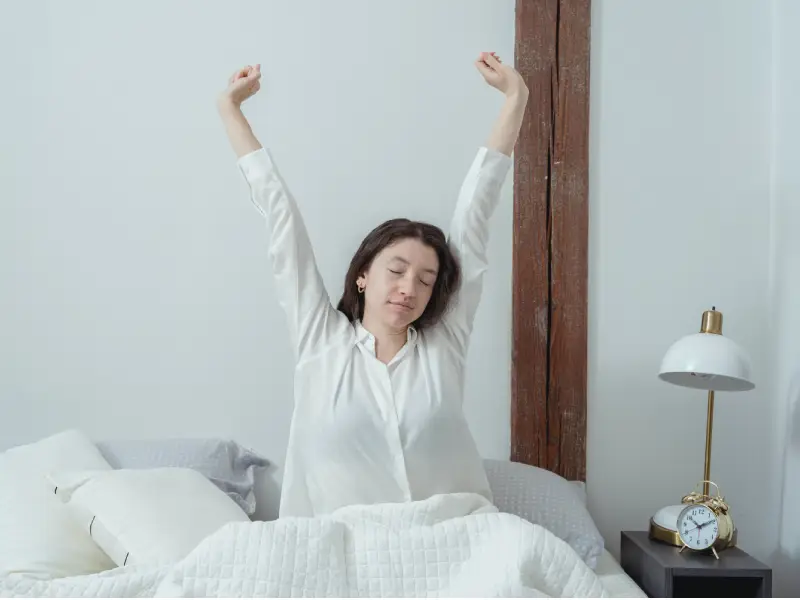Table of Contents:
- Introduction
- Factors Affecting Sleep Quality
- Huberman’s 10 Tips for Better Sleep
- Maintain a Regular Sleep Schedule
- Reduce Caffeine Intake
- Avoid Screens before Bed (Blue Light Effect)
- Keep the Bedroom Cool and Comfortable
- Reduce Screen Time and Use Blue & Green Light Blockers
- Adopt Relaxation Techniques
- Practice a Positive Mindset
- Engage in Regular Physical Activity
- Follow a Balanced and Healthy Diet
- Seek Professional Guidance for Customized Diet and Home Workouts
- Conclusion
- FAQs
Introduction:
Sleep is a fundamental aspect of our lives, essential for our overall well-being and productivity. However, in today’s fast-paced world, many individuals struggle with achieving restful and rejuvenating sleep. In this blog post, we will explore the various factors that affect sleep quality and delve into ten valuable tips shared by Dr. Huberman, a renowned sleep expert, to help you improve your sleep habits. By implementing these tips, you can transform your nights and wake up refreshed and ready to conquer the day.
Factors Affecting Sleep Quality:
Temperature:
The ambient temperature of your bedroom plays a crucial role in the quality of your sleep. Research suggests that a cool room, between 60 to 67 degrees Fahrenheit (15 to 19 degrees Celsius), promotes better sleep. Consider investing in a fan or adjusting your thermostat to create a comfortable sleep environment.
Use of Gadgets before Bedtime:

Engaging with electronic devices before bed can interfere with your sleep patterns. The blue light emitted by smartphones, tablets, and computers suppresses the production of melatonin, a hormone that regulates sleep. Make it a habit to disconnect from your devices at least an hour before bedtime to allow your brain to transition into a more relaxed state.
Stress and Anxiety:
Mental and emotional well-being significantly impact the quality of your sleep. Stress and anxiety can lead to racing thoughts, making it difficult to fall asleep. Incorporating relaxation techniques such as deep breathing exercises, meditation, or listening to calming music before bed can help alleviate stress and prepare your mind for a restful night’s sleep.
Physical Activity and Diet:
Regular physical activity and a balanced diet are essential for overall health, including sleep quality. Engaging in moderate exercise, such as walking or yoga, can promote better sleep. Additionally, avoid heavy meals close to bedtime, as the digestive process can interfere with sleep. Instead, opt for a light snack that combines protein and complex carbohydrates to induce sleepiness.

Huberman's 10 Tips for Better Sleep:
1- Maintain a Regular Sleep Schedule:
Establishing a consistent sleep schedule, including waking up and going to bed at the same time every day, helps regulate your body’s internal clock. Aim for at least seven to nine hours of uninterrupted sleep each night to ensure optimal rest.

2- Reduce Caffeine Intake:
Caffeine is a stimulant that can disrupt sleep patterns, especially if consumed in the afternoon or evening. Limit your caffeine intake, and avoid consuming it within six hours of bedtime. Opt for herbal tea or decaffeinated alternatives instead.
3- Avoid Screens before Bed (Blue Light Effect):
The blue light emitted by electronic screens, such as smartphones, tablets, and televisions, can suppress melatonin production and disrupt your sleep-wake cycle. Minimize screen time before bed and consider using blue light filters or glasses to reduce exposure to this sleep-disrupting light.
4- Keep the Bedroom Cool and Comfortable:
Creating an optimal sleep environment is crucial for quality rest. Keep your bedroom dark, quiet, and at a cool temperature to promote deep sleep. Consider using blackout curtains, earplugs, or a white noise machine to block out any disturbances.

5- Reduce Screen Time and Use Blue & Green Light Blockers:
In addition to avoiding screens before bed, reducing overall screen time throughout the day can positively impact sleep. When necessary, use blue and green light-blocking apps or filters on your devices to minimize their disruptive effects on your circadian rhythm.
6- Adopt Relaxation Techniques:
Incorporating relaxation techniques into your bedtime routine can signal your body and mind that it’s time to unwind. Experiment with practices like reading a book, taking a warm bath, or listening to soothing music. Find what works best for you and make it a regular part of your evening ritual.
7- Practice a Positive Mindset:
Cultivating a positive mindset can significantly contribute to better sleep. Engage in activities that promote relaxation and positivity, such as journaling, gratitude exercises, or practicing mindfulness. By shifting your focus to positive thoughts before bed, you can reduce stress and anxiety, allowing for a more peaceful sleep.

8- Engage in Regular Physical Activity:
Regular physical activity during the day can help regulate your sleep-wake cycle. Aim for at least 30 minutes of moderate-intensity exercise most days of the week. However, avoid exercising too close to bedtime, as it can elevate your heart rate and make it challenging to fall asleep.
9- Follow a Balanced and Healthy Diet:
Your diet can impact your sleep quality. Avoid heavy, greasy, and spicy foods close to bedtime, as they can cause indigestion and discomfort. Instead, opt for a well-balanced diet rich in fruits, vegetables, whole grains, and lean proteins. Additionally, certain foods, such as bananas, almonds, chamomile tea and ashwagandha, can promote relaxation and enhance sleep.
10- Seek Professional Guidance for Customized Diet and Home Workouts:
If you’re struggling with sleep issues that persist despite implementing these tips, it may be beneficial to seek professional guidance. Consulting with a sleep specialist, nutritionist, or personal trainer can help tailor a sleep, diet, and exercise plan that addresses your specific needs and enhances your sleep quality.
9. Conclusion:
In conclusion, Dr. Huberman’s “10 Tips for Better Sleep” provides valuable insights into the main factors that affect sleep quality. By following the tips presented in the video, individuals can improve their sleep quality, feel more refreshed, and lead healthier and happier lives. A better sleep routine can enhance productivity, mood, and focus on a daily basis. Therefore, it is crucial to prioritize sleep and take measures to optimize it for physical and mental well-being.
10. Frequently Asked Questions (FAQs):
- Q: What are the main factors that affect sleep quality?
- A: The main factors that affect sleep quality include temperature, screen usage before bedtime, stress and anxiety levels, physical activity, and diet.
- Q: How can maintaining a regular sleep schedule improve sleep quality?
- A: Maintaining a regular sleep schedule helps regulate the body’s internal clock, making it easier to fall asleep and wake up. Consistency in sleep patterns promotes better sleep quality.
- Q: Why is reducing screen time before bed important for better sleep?
- A: Screens emit blue light, which can interfere with the body’s natural sleep-wake cycle. Reducing screen time before bed allows the body to wind down and prepares it for a restful sleep.
- Q: How does temperature affect sleep quality?
- A: Keeping the bedroom cool and comfortable (between 60 to 67 degrees Fahrenheit) promotes better sleep quality. Cooler temperatures reduce discomfort and create an optimal environment for a good night’s sleep.
- Q: What are some relaxation techniques recommended for better sleep?
- A: Deep breathing exercises, yoga, meditation, and practicing a positive mindset are effective relaxation techniques that can help alleviate stress levels and improve sleep quality.
- Q: Can exercise and a balanced diet contribute to improved sleep quality?
- A. Yes, regular physical activity can enhance sleep quality by reducing the time it takes to fall asleep and promoting deep sleep. Following a balanced and healthy diet can also contribute to better sleep by reducing discomfort and indigestion.
Q. Where can I find blue and green light blockers?
A. Blue and green light blockers can be purchased online from various retailers. One recommended source is the following Amazon link
Q. Are there any natural remedies to reduce stress and anxiety for better sleep?
- A. Yes, natural herbs like Ashwagandha can help lower cortisol levels and reduce stress, promoting better sleep quality. Ashwagandha products can be found on Amazon, for example, at the following link
- Q. How can I seek professional guidance for a customized diet and home workouts?
- A. For personalized diet and home workouts, you can contact the provider mentioned in the article or seek assistance from a qualified nutritionist or fitness professional who can create a customized plan based on your specific needs.
- Q. What are the benefits of prioritizing sleep and optimizing it for physical and mental well-being?
- A. Prioritizing sleep and optimizing it for physical and mental well-being can lead to improved productivity, enhanced mood, increased focus, better overall health, reduced risk of chronic diseases, and a higher quality of life. It plays a vital role in maintaining our overall well-being and happiness.
Latest Articles
Popular Reviews
AmRelieve Knee support
The Role of Whey Protein for Fitness
Elastic rubber band exercise
Essential Platinum Creatine
How can we help you?
We are your one-stop-shop for all things sports, nutrition and stress management. Our team of experts provides you with the latest reviews on sports equipment, nutrition facts and stress management advice. We also provide ratings to help you make informed decisions on what to buy. Stay ahead of the game with our blog website! Join our community today and get access to exclusive content and deals.
Most used tags
#Adaptogens #ModernNutrition #HolisticHealth #StressRelief #HealthyLiving #BrainHealth #CognitiveFunction #EnduranceTraining • #ExerciseForMentalHealth #ExercisePsychology #FitnessChallenge #FunctionalFitness • #HyroxRace • #MentalFitness #MentalHealth #ExerciseBenefits #MindBodyConnection #StressRelief #FocusThroughFitness #EmotionalWellBeing #HealthyLiving #FitnessMotivation #MentalHealthAndExercise #MentalWellness #Mood-boosting winter workouts #PhysicalActivity #WellnessJourney #Winter workout motivation ACLInjury ACLSurgery Blood pressure Cardiovascular exercise ChiaPudding Exercise fitness Gains healing healthy HealthyEating HealthyRecipes HyroxFitness • injury Mental Health in Motion muscle gain NutrientPackedMeals Prevention Resistance training Sport SportsInjuryTreatment Stretching and Cooling Down Supplements therapy Top Wearable Fitness Technology Trends Shaping 2024 training weight loss wellbeing Workout Routine










